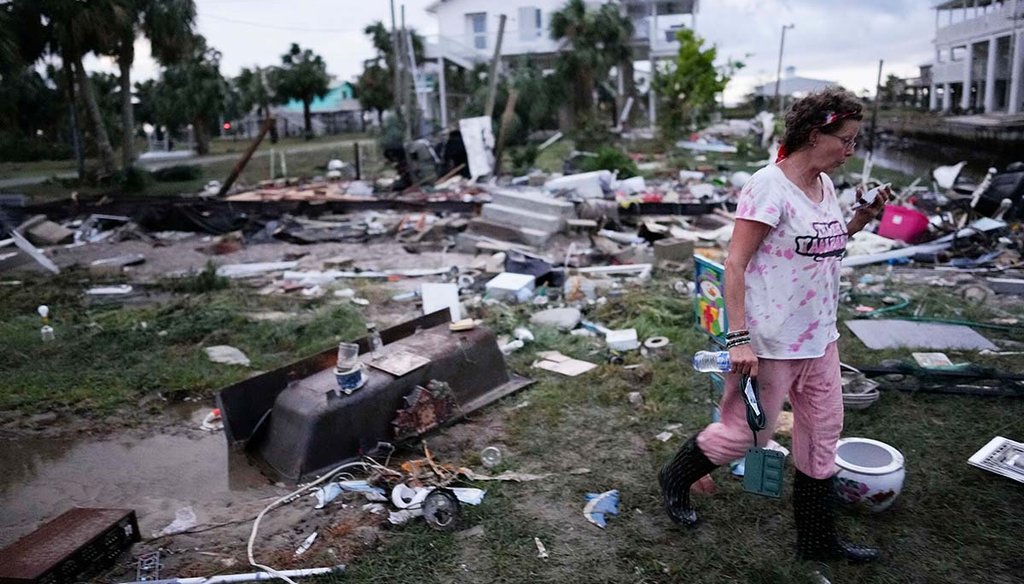

Our only agenda is to publish the truth so you can be an informed participant in democracy.
We need your help.


Jewell Baggett walks through debris Aug. 30, 2023, in Horseshoe Beach, Fla., after the passage of Hurricane Idalia. Her mother's home had stood on the lot before the storm hit. (AP)
Biden’s statistic is in tune with official federal government statistics.
The year Biden referred to, 2022, produced the third-highest annual disaster costs since recordkeeping began in 1980.
However, the statistic is calculated by adding up the damages only for events that individually caused $1 billion in damages. This excludes smaller weather events, which would add to the total.
In a White House event to promote climate change awareness, President Joe Biden argued that rising temperatures and extreme weather come with a significant cost.
"Last year alone, natural disasters in America caused $178 billion in damages," Biden said in his Nov. 14 remarks.
The number Biden cited is consistent with a widely cited federal statistic, but it’s worth noting what that figure does — and doesn’t — reflect.
The National Oceanic and Atmospheric Administration calculates the most commonly cited statistic on disaster losses. It adds together the total costs for weather events that individually cost at least $1 billion. The disasters counted include drought, flooding, freezing, severe storms, tropical cyclones, wildfires and winter storms.
In 2022, these disasters cost a cumulative $178.8 billion, right about what Biden said. That’s the third-highest annual amount since the statistic was first calculated and trails only 2017, when Hurricanes Harvey, Irma, and Maria made landfall, and 2005, when Hurricanes Katrina and Rita took their toll.
The annual dollar figures have been adjusted for inflation.
Although the cost total zigzags from year to year, the statistic shows an overall rise in the cost burden. Between 1980 and 2016, the average disaster cost per year was $40.1 billion. But from 2017 to 2022, the average figure more than quadrupled to $168.5 billion.
This cost increase has paralleled a rise in the number of $1 billion disaster events. From 2017 to 2022, the U.S. has averaged more than 18 billion-dollar events — triple the average from 1980 to 2016. So far, 2023 has brought a record 25 incidents.
Although these numbers are widely shared, they do not encompass the full range of disaster losses.
If losses from disaster events totaling less than $1 billion were included, the total amount "would be higher," said Craig Fugate, who headed the Federal Emergency Management Agency for most of President Barack Obama’s tenure. "It’s hard to capture all of the damages from smaller events."
When PolitiFact noted this point to the White House, it pointed us to a National Oceanic and Atmospheric Administration statement that said past research showed that the $1 billion threshold captures at least 80% of disaster costs.
But those that don’t are often significant, too. In April, Fort Lauderdale, Florida, received a record 26 inches of rainfall over two days. The flooding closed the Fort Lauderdale-Hollywood International Airport for two days and damaged homes and businesses. State officials determined that 1,095 homes sustained major damage and 255 had minor damage. Some homes were contaminated with raw sewage. The basement of Fort Lauderdale’s City Hall flooded, forcing employees to move to rented space; city officials are moving toward razing the building.
Biden declared parts of the city a federal disaster area. WLRN, a public radio station and PolitiFact partner, reported in October that the Federal Emergency Management Agency had provided $36.2 million to 9,570 uninsured and underinsured households in Broward County. The agency also paid out $218.3 million to 3,100 policyholders through the National Flood Insurance Program.
Despite the widespread damage, the preliminary cost estimate was about $100 million, the Sun Sentinel reported. That number could rise — our efforts to confirm a final figure with officials were unsuccessful. But even if it did, it would likely fall short of the $1 billion in losses needed to qualify for inclusion in the $178 billion figure Biden cited.
Biden said, "Last year alone, natural disasters in America caused $178 billion in damages."
That’s in tune with official federal government statistics, and it ranks as the third-highest annual total since disaster cost records started being kept in 1980.
However, the statistic is calculated by adding up the damages only for weather disasters that individually caused $1 billion in damages. This excludes smaller weather events, which would add to the total.
The statement is accurate but needs additional information, so we rate it Mostly True.
PolitiFact Staff Writer Amy Sherman contributed to this report.
RELATED: All of our fact-checks about natural disasters
RELATED: Fact-checking 2024 presidential candidates, who’s running
Joe Biden, remarks on climate change, Nov. 14, 2023
National Oceanic and Atmospheric Administration, "United States Billion Dollar Disaster Events (CPI-Adjusted)," accessed Nov. 14, 2023
National Oceanic and Atmospheric Administration, "Billion-Dollar Weather and Climate Disasters FAQ," accessed Nov. 15, 2023
Sun Sentinel, Broward’s historic flooding caused more than $100 million in losses, major damage to 1,095 homes, and job layoffs, April 25, 2023
Sun Sentinel, Fort Lauderdale: Time to knock down flood-damaged City Hall, Aug. 25, 2023
WLRN, Reports on Fort Lauderdale flood show heroism, weaknesses as city ramps up infrastructure projects, Oct. 26, 2023
Email interview with Craig Fugate, former head of the Federal Emergency Management Agency, Nov. 14, 2023
In a world of wild talk and fake news, help us stand up for the facts.
